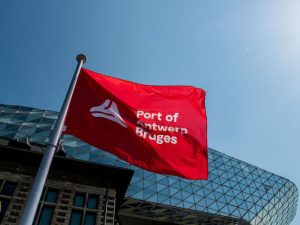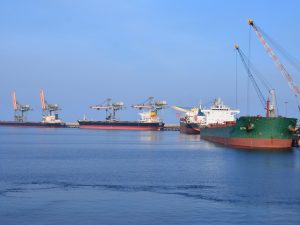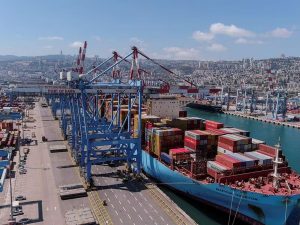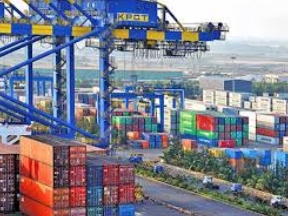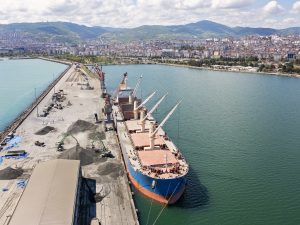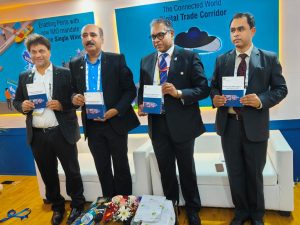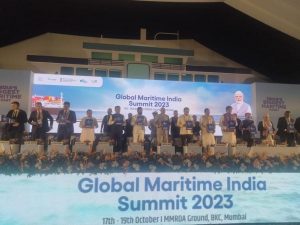With an aim to foster meaningful connections and explore avenues for collaboration in sectors essential to both regions, Port of Antwerp-Bruges, with a delegation led by Vice President Luc Arnouts, is organizing a high impact roadshow to India in collaboration with Flanders Investment & Trade. The road show is set to kick-off in India from November 18 to 22 in three major cities featuring New Delhi, Ahmedabad, and Mumbai. Through this initiative, the firm aims to deepen the relationship with India, one of its vital trading partners. The initiative will provide opportunities for engaging with key industry leaders, site visits to major Indian conglomerates, and thought-provoking panel discussions and roundtables. Tailored B2B meetings and networking events, coordinated with local chambers of commerce. The roadshow itinerary includes meetings with Indian energy giants. The aim is to strengthen these relationships and become a critical gateway for India’s green energy exports to Europe.
Read More »Adani Gangavaram Port records 52% growth in timber log handling
Adani Gangavaram Port sets a new record of timber log handling on consecutive days of handling 4,392 metric tons and 4,206 metric tons of timber logs for the vessel MV Mangusta. The port surpassed its previous record of 2,900 metric tons in a single day by 52% on growth. The port has been able to surpass its previous records as management has made strategic investments in infrastructure for efficient cargo handling and railway facilities. The port expects to set further operational records in FY24 and deliver Industry Best Services to its customers. Adani Gangavaram Port’s operational expertise and the capability of its advanced infrastructure, which enables high productivity and prioritizes safety. The port team’s dedication and efficiency underscore the facility’s ongoing commitment to optimizing performance and supporting the growing demands of the shipping and logistics industry. Adani Gangavaram Port said, “We are extremely delighted on this achievement. We at Adani Gangavaram Port always strive to provide the best service to our customers. We offer substantial economic benefits to Indian importers combined with highly efficient port operations and evacuation systems with faster turnaround time & delivery. We are extremely happy to see the trade derive benefits from the modern deep-water infrastructure at the port.”
Read More »JNPA records 11.86% growth in container traffic for Oct
Jawaharlal Nehru Port Authority (JNPA) has reported an 11.86 per cent YoY rise in container traffic for the month of October. The container traffic for the month stood at 6,14,651 TEUs (twenty-foot equivalent units, whereas the port handled 5,49,487 TEUs of containers in the corresponding period of 2023. In October 2024, the port saw a 2.26 per cent YoY increase in the container handling capacity. The total cargo handled in the month reached 7.62 million tonnes.
Read More »Major ports record surge in cargo demand by 6% in September
With the handling of more than 65 million metric tonnes (MMT), Major ports recorded a cargo demand growth of 6 per cent in the month of September. The demand growth is primarily driven by crude oil cargo shipments and a surge in miscellaneous commodities. There was a 9 per cent growth in EXIM cargo and a decline of 1.9 per cent in coastal cargo during previous month. As of now, the Major Ports have handled 414 MMT of cargo in the Fiscal Year 25, with a growth of 5 per cent Year-on-Year. Coastal cargo reached 93 MMT in FY 25, recording a 4 per cent YoY growth.
Read More »Adani Ports, APSEZ sign MoU to integrate tch in logistics biz
Adani Ports and Special Economic Zone (APSEZ) signed MoU with Rorix Holdings, Abu Dhabi-based global trade facilitation and finance company, to integrate technologies into their logistics and trading platforms. The MoU was signed during the UAE-India Business Forum. As per APSEZ’s stock exchange filing, both companies are aiming “to leverage the strengths of both organisations to integrate advanced technologies into their logistics and trading platforms and create synergies that will transform the commodities market ecosystem”. Thani bin Ahmed Al Zeyoudi, executive chairman of Rorix Holdings, stated, “By combining our expertise in regulated financial platforms and market infrastructure with Adani Ports’ strength in logistics and port management, we aim to revolutionise the way commodities are traded, stored, and managed.”
Read More »Sarbananda Sonowal sworn in as Union Minister of Ports, Shipping and Waterways for the third time
Sarbananda Sonowal, a BJP veteran from Assam, took the oath as a Union Cabinet Minister of Ports, Shipping & Waterways in the Modi government for the third time. The 61-year-old’s clean image, oratorial skills and popularity among the masses in Assam ensured that he got another stint at the Centre for the third time. Sonowal was the minister of state (independent charge) of youth affairs and sports in the first Modi government from 2014 to 2016, when he resigned to head the first Bharatiya Janata Party (BJP)-led coalition in Assam.
Read More »India’s 12 major ports observe 4.45% cargo volume growth in FY24
According to the Ministry of Ports, Shipping and Waterways, major ports collectively handled 12.310 million TEUs, up 8.06% from FY23’s 11.392 million TEUs. Jawaharlal Nehru Port Authority led the way by managing 6.43 million TEUs, over half of the total volume. Petroleum, oil, and lubricants (POL) cargo increased 5.06% to 245.990 mt from the previous year’s 234.137 mt. Iron ore shipments surged 32.68% to 61.031 mt, raw fertilizer shipments rose 13.56% to 9.406 mt, and coking coal and other coal movements increased 10.24% to 64.939 mt. Moreover, Paradip Port Authority led cargo handling among major ports, reaching 145.379 mt in FY24, up 7.40% from the previous year’s 135.362 mt. India’s Ports and Shipping sector has been on a remarkable upswing lately. Whether it’s the external trade, expanding ports’ capacity, or the 7,517 kilometers of coastline dotted with over 200 ports, the growth has been undeniable. And recently, the performance of the 12 major ports under the Union government’s ownership saw an uptick in cargo handling. In FY24, these ports collectively managed a staggering 819.227 million tonnes (mt) of cargo, marking a 4.45 percent increase from the previous year’s 784.305 mt. With India’s ports handling approximately 95% of the nation’s international trade volume, this surge in growth signals a new era of efficiency for the industry. What 2024 has seen so far?
Read More »SITA launches SmartSea, tech solution to transform maritime
SITA launches SmartSea through an initial agreement with Columbia Shipmanagement (CSM), the world-class ship manager and maritime service provider. SmartSea is the industry’s first company with the power to reshape the maritime sector by facilitating access to the same advanced technology that has already transformed the air transport industry. At the same time, CSM becomes the first SmartSea client to exponentially upscale its operations through this cutting-edge technology. With this strategic step, SITA is embedding its transformative footprint into the maritime industry, breaking boundaries and simplifying processes for more efficient and profitable operations across the entire value chain. With 75 years of experience, SITA serves 95% of international destinations in the air travel industry, and over 2,500 airlines, airports, ground handlers and governments all working closely with the company. More than 70 governments and all G20 nations trust SITA solutions, and 85% of international air passengers globally benefit from SITA digital border solutions. SITA’s undeniable role in transforming the air industry and shaping it into what it is now is the strongest proof of the value SITA can provide to the maritime sector. SITA’s expansion into maritime is clear evidence of its ambition and capacity to boost digital innovation in a sector that, facing similar challenges, can be greatly enhanced by solutions for the air transport industry, estimated to be 10-15 years ahead in terms of technology adoption. Both the maritime and aviation sectors operate in a complex and highly regulated ecosystem globally, are capital intensive, and heavily reliant on data and communication while also facing very similar sustainability requirements. Moreover, ports and ship terminals experience the same challenges and opportunities; vessels require turnaround and maintenance, the same as aircraft, …
Read More »30 % ports unprepared to adopt IMO’s MSW mandate: Kale
Kale Logistics Solutions (Kale) has published a readiness survey of 200 ports that revealed 30 per cent are not prepared to adopt the International Maritime Organisation (IMO)’s Maritime Single Window (MSW) mandate, which will become compulsory worldwide from 1st of January 2024. Kale highlighted the urgency for the industry to speed up its digital transformation as it unveiled the survey results, which also cited high implementation costs, long timelines, and varying levels of digital readiness as leading factors hindering regulatory compliance. The study involved ports located throughout the Asia Pacific, Middle East, Europe, Africa, North America, and South America, and emphasised that Port Community Systems embedded with an MSW are integral to achieving the true potential of a port. “The purpose of this study was to identify the tangible benefits the maritime industry can achieve with technology intervention, and the results showed potential savings of up to USD50 billion annually by using MSW platforms,” said Vineet Malhotra, Co-Founder and Director, Kale Logistics Solutions. “However, these benefits are subject to 100 percent adoption of the MSW, and our report reveals that ports are encountering a number of barriers that hinder this digitalisation. “The MSW concept has the potential to revolutionise the international shipping industry.” Kale’s MSW platform is compliant with IMO standards and enables information and documentation to be transferred electronically between maritime and port stakeholders, which will become a compulsory requirement from the start of 2024. “The importance of this study will sow the seed for a digital revolution in the maritime industry worldwide, demonstrating how digitisation can not only bring order to the ongoing chaotic operations in the industry but also achieve significant sustainability goals in the long run,” …
Read More »PM unveils Amrit Kaal Vision 2047 at Maritime Summit
Narendra Modi, Prime Minister of India inaugurated the third edition of the Global Maritime India Summit 2023 via video conferencing on Monday in Mumbai. The summit will be held till 19 October. During the programme, Modi unveiled ‘Amrit Kaal Vision 2047’, the blueprint for the Indian maritime blue economy. The blueprint outlines initiatives aimed at enhancing port facilities, promoting sustainable practices, and facilitating international collaboration. He also laid the foundation stone of projects worth over Rs 23,000 crore aligned with the ‘Amrit Kaal Vision 2047’ for the Indian maritime blue economy. He laid the foundation stone of Tuna Tekra all-weather deep draft terminal, to be built at a cost of Rs 4, 500 crore at Deendayal Port Authority in Gujarat. This latest greenfield terminal will be developed in PPP mode. The terminal will handle next-gen vessels exceeding 18,000 x 20-foot equivalent units, TEUs, and will act as a gateway for Indian trade via the India-Middle East-Europe Economic Corridor. Modi also dedicated 300 Memoranda of Understanding worth RS 7 lakh crore rupees for global and national partnership in the maritime sector, during the programme.
Read More » Cargo Breaking News
Cargo Breaking News
